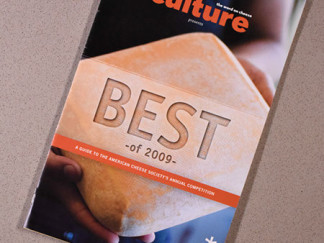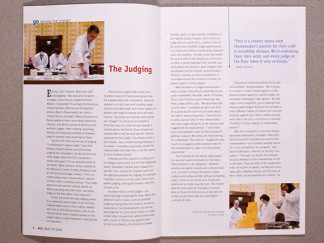I’ve worn a lot of writing hats over the years, including as a brochure writer. While many companies have gone digital with their media, the brochure is still alive and well, and is a terrific way to introduce a client or customer to your brand, product, service or event.
The copywriting for this piece needed to promote the American Cheese Society and the cheesemaker contestants in its annual Best Of competition, as well as create a historical framework for what the organization does. Thus the copy straddles both the marketing and editorial worlds, and becomes a hybrid of brochure and booklet (brooklet?). Whatever we call it, it always makes me want to kick back with a glass of wine and a plate of artisanal cheeses. Chutney optional.
Honor Society
The American Cheese Society builds a legacy for high-quality, hand-crafted American cheeses
Few experiences can match the palate-pleasing zing of freshly shredded Parmesan sprinkled over bubbling baked pasta and juicy plum tomato sauce, the toasty comfort of a piece of Gruyère melted between layers of sliced ham and grilled peasant bread, or the sublime flavor of Camembert paired with a crisp Chenin Blanc and boysenberry jam. Cheese is, to paraphrase romantics everywhere, a universal language, yet until fairly recently, most Americans were better acquainted with the plastic-wrapped, rubbery “commodity” cheeses than with high-quality, hand-crafted styles. But thanks to the American Cheese Society (ACS), food lovers in the States have been let in on the artisanal-cheese secret that Europeans have known for centuries.
The ACS was founded in 1983 by Dr. Frank Kosikowski of Cornell University in Ithaca, New York. He gathered his post-doctoral candidates, fellow professors, and cheesemaking friends into a national grassroots organization aimed at promoting the work of home and farm cheesemakers, and the appreciation of these cheeses.
The First Annual ACS conference was held in Ithaca in June of the same year, and played host to 150 small-scale and home cheesemakers, retailers, cheese enthusiasts, and renowned academics. According to Christine Hyatt, founder of Cheese Chick LLC of Beaverton, Oregon, a boutique cheese education and marketing company, and an ACS board member who helped put together a historical documentary on the organization for its twenty-fifth anniversary last year, “Those early years were really about getting the message out and encouraging people to embrace foods they weren’t familiar with.”
In 1985, the ACS organized its first competition, along with a mini cheese festival, at the Third Annual Conference; it featured 89 cheeses by 30 cheesemakers in 7 categories. One of these was Paula Lambert, founder of the Mozzarella Company in Dallas, Tex., who entered the competition upon the urging of a friend. She recalls, “After the conference, I got an envelope in the mail. I opened it, and all these ribbons fell out.” It was a turning point for Lambert, and for the hundreds of cheesemakers who would follow in her footsteps. “It really gave validity to what I was doing,” she explains.
By 1987, word of mouth had spread. The Fifth Annual Conference in Boston included 170 contest entries, as well as the ACS’s first cheese sale and auction, and attracted strong press coverage. Unfortunately, a year after this triumph, founding father Kosikowski became ill, and the organization went through a brief decline.
The cheese community rallied, and by the mid-1990s, the ACS was back on solid footing. It helped move more American cheeses—everything from traditional varieties such as Monterey Jack to European-style Goudas, Cotijas, and fetas—into the mainstream marketplace. The group even organized an educational trip to Greece in 1996, which proved an influential learning experience for many members.
But the ACS knew changes were needed in order to avoid stagnancy. In the early 2000s, the group redefined its mission statement and hired a management company to create a more defined, professional structure. The ACS also became an advocate by forming the Cheese of Choice Coalition, which concentrated on the preservation of raw-milk cheeses and affecting agricultural policy making.
With renewed efforts on educating the public about the quality and variety of American artisanal cheeses, between 2003 and 2008, the ACS experienced a period of explosive growth, doubling its membership (now more than 1,400) and competition entries. A better reputation in the marketplace also meant that many of the ACS’s cheesemaker members underwent their own growth, with their businesses becoming profitable instead of simply viable.
Recent years have put a premium on the annual conferences, which not only provide valuable networking opportunities for cheesemakers and retailers, but also offer educational tracks on everything from using rennet to marketing the finished product. Many cheesemakers credit the conferences with exponential improvement in their products. “I’ve learned so much just meeting all these other cheesemakers,” Lambert offers. “It’s impossible to go to a Cheese Society conference and not absorb tons of information.”
Despite the current economic downturn, this year, the ACS surpassed its 2008 numbers in both cheesemakers and conference attendees. The 2009 Annual Conference in Austin, Texas, was the stage for more than 1,300 competition entries, 600 participants, and hundreds of volunteers. “I am continually surprised by how many dynamic, passionate people have been involved over the years,” says Hyatt. “I’m amazed at how much everyone is willing to give in support of cheese.”
The ACS is now focused on acting as a mouthpiece for the American artisanal cheese movement, helping to educate the public, policy makers, and regulatory authorities, and providing constructive input for cheesemakers in order to help their products take their rightful place on the world stage.
“We really want to be an advocate and take the cheese more mainstream,” says Hyatt. “And we want to answer the question of why it’s important to know where your cheese comes from and who makes it. In this way, we can also be an advocate of locally based economics, which is extremely important.”
It’s just another chapter in the unique, grassroots story of the ACS, as it builds a heritage for American cheese.

